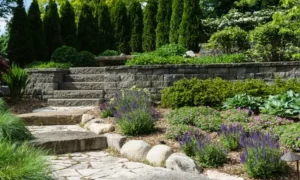Homeowners today are more conscious than ever about the environmental impact of their choices, including how they maintain their outdoor spaces. Landscaping is not only about aesthetics; it’s also an opportunity to contribute positively to the local ecosystem. Sustainable landscaping has emerged as a practical and responsible way to create beautiful, functional yards while minimizing harm to the environment.
In regions like Arlington, where urban development continues to grow, sustainable landscaping practices help preserve natural resources, promote biodiversity, and reduce pollution. Homeowners are increasingly embracing these methods to align with eco-friendly living while enhancing the beauty and value of their properties.
Companies such as Eagle Landscape Arlington Heights specialize in creating outdoor environments that combine visual appeal with environmentally responsible design. By incorporating sustainable techniques, homeowners can enjoy thriving landscapes that support both their lifestyle and the planet.
What is Sustainable Landscaping?
Sustainable landscaping refers to designing, installing, and maintaining outdoor spaces in ways that conserve water, reduce waste, and protect natural resources. It involves selecting plants suited to the local climate, utilizing eco-friendly materials, and implementing efficient water management systems.
Unlike traditional landscaping, which often relies on excessive water use, chemical fertilizers, and imported plants, sustainable practices focus on reducing environmental impact while creating attractive, functional spaces.
This approach benefits homeowners by lowering maintenance costs, conserving resources, and supporting the health of local ecosystems.
Choosing Native and Climate-Appropriate Plants
One of the most effective ways to promote sustainability in landscaping is by using native plants. These species have adapted to the local climate, soil conditions, and wildlife, making them naturally resilient and easier to maintain.
In Arlington, native plants thrive with minimal watering, require fewer chemical treatments, and provide food and habitat for local birds, bees, and pollinators. Incorporating these species into your landscape reduces maintenance demands while supporting biodiversity.
Professional landscapers like Eagle Landscape Arlington Heights help homeowners select the right combination of native trees, shrubs, flowers, and ground covers to create visually appealing and ecologically sound yards.
Water Conservation Strategies
Water scarcity and the high cost of irrigation make water conservation a key element of sustainable landscaping. Smart design choices help homeowners reduce water usage without compromising the beauty of their outdoor spaces.
Some effective water-saving strategies include:
- Installing drip irrigation systems that deliver water directly to plant roots
- Grouping plants with similar water needs together
- Using mulch to retain soil moisture and suppress weeds
- Grading landscapes to prevent runoff and promote water absorption
By implementing these methods, homeowners can maintain healthy, vibrant landscapes while conserving this vital resource.
Soil Health and Organic Practices
Healthy soil is the foundation of a successful and sustainable landscape. It supports plant growth, improves water retention, and reduces the need for chemical fertilizers.
Enhancing soil quality through composting, natural amendments, and minimal disturbance techniques promotes strong root systems and plant health. Avoiding synthetic pesticides and herbicides further protects beneficial insects, pollinators, and the broader ecosystem.
Sustainable landscaping also involves reducing waste by composting yard clippings and organic debris, turning them into valuable soil-enriching materials.
Companies like Eagle Landscape Arlington Heights incorporate organic practices into their landscaping projects, helping homeowners create thriving, low-impact outdoor environments.
Energy-Efficient Landscape Design
A well-designed landscape can contribute to energy savings within the home. Strategic placement of trees, shrubs, and other elements can reduce heating and cooling costs by providing shade, windbreaks, and insulation.
For example, planting deciduous trees near windows allows for shade during hot summers while permitting sunlight to warm the home during winter months. Evergreen shrubs can act as wind barriers, reducing heat loss during colder seasons.
These energy-efficient designs lower utility bills and make homes more comfortable year-round, while also contributing to environmental sustainability.
Reducing Hardscape Impact
Hardscape elements like patios, pathways, and driveways are essential parts of many landscapes, but traditional materials can contribute to environmental problems such as stormwater runoff and heat absorption.
Sustainable landscaping promotes the use of permeable materials, such as gravel, permeable pavers, or natural stone, which allow rainwater to soak into the ground rather than running off into storm drains.
Minimizing impervious surfaces and incorporating rain gardens or bioswales further enhances stormwater management and supports the health of nearby waterways.
Creating Wildlife-Friendly Habitats
Sustainable landscapes provide safe spaces for wildlife, contributing to ecological balance. Native plants, water features, and thoughtful design encourage birds, pollinators, and beneficial insects to visit and thrive in the area.
Homeowners can incorporate bird feeders, bee-friendly flower beds, and small ponds to create inviting habitats that support local wildlife. These features add life and movement to the landscape, enriching the overall outdoor experience.
Professional services like those from Eagle Landscape Arlington Heights help homeowners integrate wildlife-friendly elements into their yards while maintaining a cohesive, attractive design.
Conclusion
Sustainable landscaping offers homeowners in Arlington the opportunity to create beautiful, functional, and environmentally responsible outdoor spaces. By incorporating native plants, conserving water, improving soil health, reducing hardscape impact, and supporting wildlife, property owners can enjoy landscapes that are as beneficial to the planet as they are to their homes. With the expertise of Eagle Landscape Arlington Heights, residents can achieve eco-friendly yards that enhance property value, promote biodiversity, and contribute to a greener, healthier community.
Read More From Techbullion



































